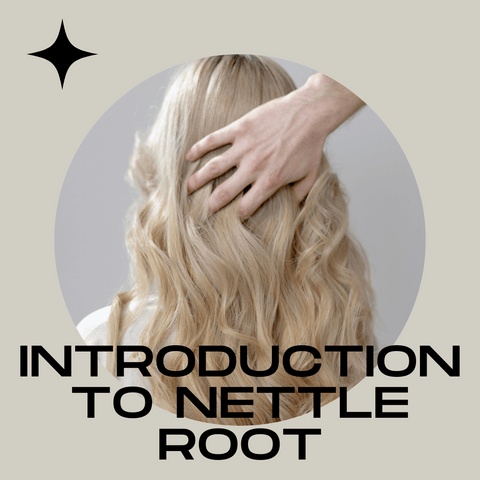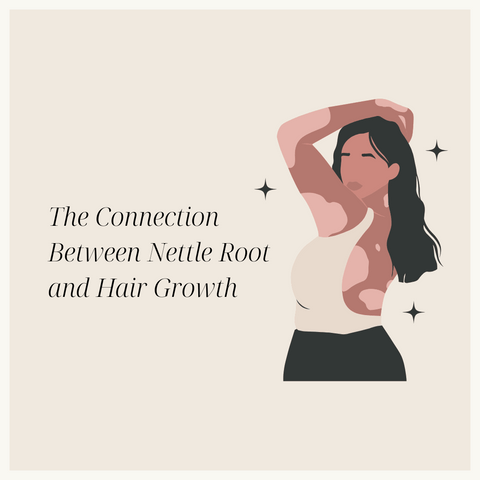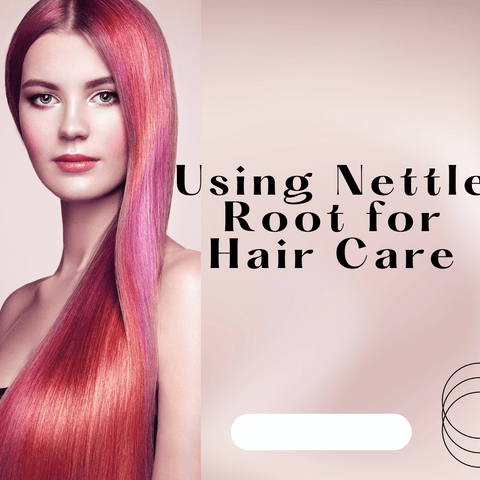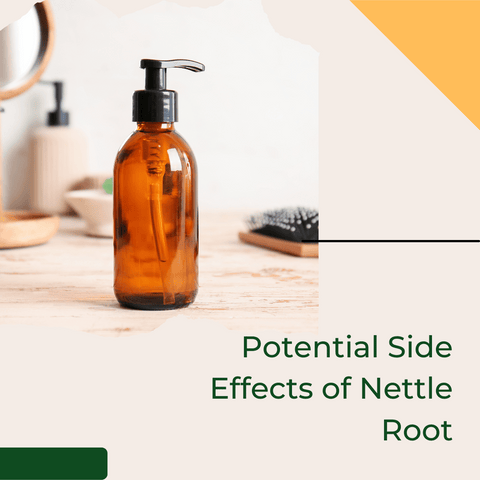Nettle root (Urtica dioica) has gained attention for its potential role in promoting hair growth and addressing issues related to hair loss, although the scientific evidence supporting these claims is somewhat limited. Nettle root extract has been used for centuries in traditional medicine for a variety of purposes, including treating hair problems. This blog offers a comprehensive examination of the connection between nettle root and hair growth. The scientific evidence for the potential advantages of nettle root for hair growth is intriguing, but more in-depth study is needed to clearly show how beneficial it is. If you are considering using nettle root supplements or products for hair health, consult a doctor or consult online dermatologist first to ensure that it is a safe and suitable choice for your unique situation.
Introduction to Nettle Root

Nettle root, scientifically known as Urtica dioica, is a plant-derived supplement that has been utilised for centuries for a variety of health benefits. It comes from the root of the stinging nettle plant, which is a perennial herbaceous plant native to Europe, Asia, and North America. Nettle root has long been utilised in herbal medicine for its possible medicinal characteristics, and it has recently attracted attention for its potential advantages in areas such as prostate health, inflammation reduction, and potentially even hair growth. Here's a quick overview of nettle root, including its look and properties, traditional uses, health benefits and active substances, hair health and other applications, forms and preparations, safety and precautions, and scientific studies. While it has shown promise in areas such as prostate health and hair growth, it is critical to approach its use with a thorough awareness of the scientific data and to check with a healthcare expert before adding it to your routine.
What is Nettle Root?
The root of the stinging nettle plant (Urtica dioica), a perennial herbaceous plant native to Europe, Asia, and North America, is known as nettle root. The stinging nettle plant can be identified by its microscopic hairs and serrated leaves, which can sting and hurt the skin when touched. Despite its stinging nature, nettle root has been utilised for millennia for its possible therapeutic benefits. The underground component of the nettle plant, nettle root, is commonly utilised in herbal medicine and dietary supplements. It includes a number of bioactive substances, including plant sterols, lignans, flavonoids, and other minerals, all of which contribute to its potential health advantages. The root is typically harvested in the autumn, when the plant's energy has moved underground.
Nettle root is available in capsules, pills, tinctures, extracts, and teas, among other forms. While nettle root is generally regarded as safe for most people when used in suitable amounts, anyone who is allergic to plants in the Urticaceae family (which includes nettles) should use caution. It's best to contact a healthcare practitioner before introducing nettle root supplements or items into your routine, especially if you have any underlying health concerns or are using drugs. While nettle root has a long history of use and shows promise, further research is needed to completely understand its mechanisms of action and effects on numerous health conditions.
Traditional Uses of Nettle Root
Nettle root (Urtica dioica root) has a long history of use for its potential therapeutic benefits in numerous cultures. For millennia, it has been utilised in herbal therapy to treat a variety of health issues. Traditional applications of nettle root include:
-
Prostate Health: Nettle root has long been used to treat prostate gland disorders. It has been used to treat symptoms of benign prostatic hyperplasia (BPH), a non-cancerous enlargement of the prostate that can cause urinary difficulties. Nettle root is thought to help reduce the size of an enlarged prostate by suppressing the release of certain hormones.
-
Joint Health: Nettle root has traditionally been used to treat arthritis and other joint-related diseases. According to some traditional practices, the anti-inflammatory qualities of nettle root may provide relief from joint discomfort and inflammation.
-
Allergies and Hay Fever: Nettle root has traditionally been used to treat allergies, especially hay fever. Some traditional healers advocate nettle root because of its possible antihistamine-like effects, which may help reduce allergy symptoms.
-
Blood Sugar Regulation: Nettle root has been utilised in several traditional medical systems to help manage blood sugar levels. While more research is needed to understand its impact on diabetes and blood sugar control, the potential advantages of nettle root in this area have been investigated.
-
Diuretic Properties: Nettle root has diuretic effects, which means it may assist in increasing urine production. It has been used in traditional herbal medicine to improve kidney and urinary tract health by encouraging the clearance of waste materials from the body.
-
Hair and Scalp Health: Nettle root has traditionally been used to promote healthy hair and treat hair loss. Traditional practices imply that its potential DHT-inhibiting abilities could help keep the scalp and hair follicles healthy.
-
Overall Tonic: In ancient medicine, nettle root was thought to be an all-around tonic. It is said to provide a variety of health benefits by assisting various biological processes.
The Connection Between Nettle Root and Hair Growth

The relationship between nettle root (Urtica dioica root) and hair growth has piqued the interest of researchers due to its potential involvement in enhancing hair health and resolving hair loss. However, while there is some suggestive data and historical use to support this link, more complete scientific research is required to demonstrate a clear cause-and-effect relationship.
-
DHT Inhibition: The capacity of nettle root to inhibit the enzyme 5-alpha-reductase is one of the key reasons postulated for its possible advantages for hair growth. This enzyme is responsible for converting testosterone, a male sex hormone, into dihydrotestosterone (DHT). DHT has been linked to hair loss, particularly in men with androgenetic alopecia (pattern baldness). Nettle root may help reduce hair loss by reducing the conversion of testosterone to DHT.
-
Anti-Inflammatory Effects: Nettle root contains anti-inflammatory chemicals. Chronic scalp irritation can disrupt the hair growth cycle and contribute to hair loss. Nettle roots may indirectly promote a healthier hair growth environment by lowering inflammation.
-
Nutrient Content: Nettle root contains vitamins (such as A and C), minerals (such as iron and magnesium), and other bioactive substances that are beneficial to general hair health. These nutrients help hair follicles grow and stay healthy.
-
Limited Clinical Evidence: While some studies have looked into the effects of nettle root extract on hair growth, the scientific evidence is limited and often of poor quality.
-
Expert Opinion: Dermatologists and hair health professionals generally recognise the potential benefits of nettle root for hair development, but they highlight that the evidence is still preliminary and that more thorough research is required before drawing conclusive conclusions. They frequently advocate nettle root as part of a comprehensive approach to hair health, along with other aspects such as diet, stress management, and proper hair care.
-
Combining Approaches: Hair loss and hair health are complex issues influenced, among other things, by genetics, hormones, and lifestyle factors. While nettle root has potential benefits, combining it with other evidence-based therapies such as minoxidil, finasteride, and professional medical assistance may produce greater outcomes for people with hair loss.
How Nettle Root Promotes Hair Growth
Nettle root (Urtica dioica root) is thought to increase hair growth through numerous processes; nevertheless, scientific study in this area is still limited, and more extensive studies are needed to completely understand its effects on hair growth. DHT suppression, anti-inflammatory effects, better blood circulation, vitamin content, sebum reduction, and hormonal balance are just a few of the reasons nettle root may help promote hair growth. While these pathways suggest that nettle root may have potential benefits for hair development, the scientific data is continuously growing and is sometimes based on preliminary studies or anecdotal observations. Furthermore, individual responses vary, and nettle root may not work for everyone or produce very minor results. Before introducing nettle root supplements or hair care products into your routine, it is recommended that you consult with a healthcare expert or dermatologist. Furthermore, for maximum outcomes, a comprehensive approach to hair health that includes a balanced diet, stress management, and regular hair care practices is required.
The Science Behind Nettle Root and Hair Health
The science underlying nettle root's possible impacts on hair health, specifically its role in encouraging hair growth and resolving hair loss, has piqued attention but remains understudied. While various mechanisms have been hypothesised and a limited number of studies have been conducted, more comprehensive research is required to completely understand the association between nettle root and hair health. DHT inhibition, limited clinical research, anti-inflammatory properties, nutrient content, interaction with other natural chemicals, and expert opinion are some of the current scientific findings. If you're thinking about using nettle root supplements or products for hair health, you should do so with a realistic grasp of the available research. Consultation with a healthcare professional or dermatologist can assist you in making informed decisions based on your unique situation.
Using Nettle Root for Hair Care

Using nettle root for hair care entails incorporating nettle root extracts or products into your hair care routine to promote scalp health, potentially improve hair growth, and maintain overall hair health. Here are some ways to use nettle root to care for your hair:
-
Nettle Root Supplements: Nettle root supplements come in a variety of formats, including capsules, tablets, and liquid extracts. These supplements are normally taken orally and are designed to deliver nettle root's potential benefits for overall health and hair health.
-
Nettle Root Shampoos and Conditioners: Some shampoos and conditioners contain nettle root extract as a component. These products are intended to be used as part of your regular hair care routine and may deliver nettle root benefits directly to the scalp and hair.
-
DIY Nettle Root Tea Rinse: You can make a nettle root tea rinse to use after shampooing your hair. Follow these steps to accomplish this:
-
To make a nettle root infusion, steep the dried nettle root in hot water for about 15-20 minutes.
-
Allow the infusion to cool to a safe temperature.
-
After shampooing, apply the nettle root infusion to your scalp and hair.
-
Massage your scalp for a few minutes before rinsing with water.
-
Nettle Root Oil Infusion: To make a nourishing oil for your scalp and hair, combine dried nettle root with a carrier oil such as coconut oil or jojoba oil. To prepare a nettle root oil infusion, follow these steps:
-
Fill a clean, dry glass jar halfway with dried nettle root.
-
Cover the nettle root with the carrier oil of your choice.
-
Place the jar in a warm, sunny location for several weeks to allow the oil to be infused with the beneficial compounds of nettle root.
-
Remove the nettle root particles from the oil by straining it.
-
Gently massage the infused oil into your scalp and hair. Before washing your hair, leave it on for a period of time (such as overnight).
-
Professional Guidance: It is recommended that you speak with a dermatologist or healthcare professional before introducing nettle root products or extracts into your hair care routine, especially if you have underlying health concerns or are using drugs. They can give you tailored guidance based on your specific requirements.
-
Consistency: It is important to remember that results may not be immediate and that consistent use over time may be required to see potential benefits.
Different Forms of Nettle Root for Hair Growth
Nettle root (Urtica dioica root) comes in a variety of forms that can potentially boost hair development and general hair health. Each kind has its own set of advantages and disadvantages. Here are some different types of nettle roots to consider:
Nettle Root Supplements:
-
Capsules or Tablets: Supplements containing nettle root are typically available in pill or tablet form. These are quick and easy ways to incorporate nettle root into your everyday routine. Follow the dosage recommendations on the product package.
-
Liquid Extracts (Tinctures): Nettle root liquid extracts, also known as tinctures, can be taken by adding a few drops to water or another beverage. Tinctures, as opposed to capsules or pills, may allow for more exact dosing.
- Nettle Root Tea: Steep dried nettle root in boiling water to make nettle root tea. You can buy dried nettle root or pre-packaged nettle root tea bags to prepare your own tea. Drinking nettle root tea may provide nettle root benefits for hair health from the inside out.
- Nettle Root Oil Infusion:
-
Infusing dried nettle root into a carrier oil can result in a nourishing oil that can be applied directly to the scalp and hair. The oil infusion allows you to reap the benefits of nettle root through topical application.
-
Place dried nettle root in a clean glass jar and cover with a carrier oil (such as coconut oil or jojoba oil) to prepare a nettle root oil infusion. Allow the combination to infuse for a few weeks before straining and using it as a scalp and hair treatment.
- Nettle Root Hair Care Products: Nettle root extract is an ingredient in certain hair care products, such as shampoos, conditioners, and treatments. These products are intended to be used in conjunction with your usual hair care routine and may deliver the advantages of nettle root to your scalp and hair.
- DIY Nettle Root Hair Masks: Nettle root powder or crushed dried nettle root can be used to make a DIY hair mask. To make a nutritious mask, combine the nettle root with other hair-friendly products such as yoghurt, honey, or aloe vera gel. Apply the mask to your scalp and hair, let it sit for a certain amount of time, and then thoroughly rinse.
When using nettle root to promote hair growth, keep the following points in mind:
-
Before beginning any new supplement or topical treatment, consult a healthcare professional or dermatologist, especially if you have underlying health conditions or are taking medications.
-
Results may vary from person to person, and consistent use over time may be required to see potential benefits.
-
If you have any negative reactions or discomfort, stop using it and consult a healthcare professional.
-
Consider using nettle root as part of a holistic approach to hair health that includes a balanced diet, proper hair care practices, and stress management.
How to Incorporate Nettle Root into Your Hair Care Routine
Incorporating nettle root (Urtica dioica root) into your hair care routine entails using nettle root products or extracts in a way that corresponds to your hair health objectives. Here's how to go about it:
- Nettle Root Supplements:
-
Follow the dosage recommendations on the supplement packaging. Typically, nettle root supplements are taken orally with water.
-
Include nettle root supplements in your daily routine, either with meals or as directed by a physician.
- Nettle Root Shampoos and Conditioners:
-
During your regular hair-washing routine, use shampoos and conditioners infused with nettle root.
-
Massage the shampoo into your scalp to distribute the product and the nettle root's potential benefits to your hair follicles and scalp.
-
To nourish and moisturise your hair, apply a conditioner infused with nettle root.
- Nettle Root Tea Rinse:
-
Using dried nettle root, make nettle root tea. Allow the tea to cool to a pleasant temperature.
-
After shampooing, apply the nettle root tea to your scalp and hair. Massage your scalp gently for a few minutes to stimulate circulation.
-
Rinse your hair with water after a few minutes.
- Nettle Root Oil Infusion:
-
Apply the oil infused with nettle root to your hair and scalp. Massage it into your scalp gently with circular motions.
-
Allow the oil to sit on your hair and scalp for a set amount of time (e.g., a few hours or overnight) for a deep conditioning treatment.
-
After the treatment, use a gentle shampoo to remove the oil from your hair.
- DIY Nettle Root Hair Masks:
-
Make a DIY hair mask with nettle root powder or crushed dried nettle root. Aloe vera gel, yoghurt, honey, and other organic ingredients can all be combined with it.
-
Apply the mask, paying special attention to the roots and tips, to your scalp and hair. Leave it on for the recommended amount of time.
-
Rinse thoroughly with water and proceed with your regular hair care routine.
- Professional Guidance:
-
Consult a dermatologist or healthcare expert before introducing nettle root products into your hair care routine, especially if you have underlying health concerns or are using drugs.
- Consistency is Key:
-
Consistency is critical for potential rewards. Incorporate nettle root products or treatments into your routine on a regular basis.
- Monitor Your Results:
-
Keep track of any changes you notice in the health of your hair and scalp. Keep in mind that outcomes may differ from person to person.
It's critical to approach the use of nettle root in your hair care routine with realistic expectations. While nettle root may have potential benefits for hair health based on its postulated mechanisms, scientific study is still in its early stages. Combining nettle root use with a balanced diet, good hair care practices, and addressing any underlying health conditions can contribute to a holistic approach to hair health.
Potential Side Effects of Nettle Root

Nettle root (Urtica dioica root) is generally considered safe for most people when used in appropriate doses and for short durations. However, like any herbal supplement or natural product, there is a possibility of side effects or adverse reactions. Here are some potential side effects and considerations to be aware of when using nettle root:
- Allergic Reactions: Some people are allergic to nettle and other plants in the Urticaceae family. Allergic responses can range from modest skin irritation to severe symptoms such as hives, itching, and difficulty breathing. If you are allergic to plants such as nettle, dandelion, or birch, you should use nettle root products with caution.
- Gastrointestinal Distress: Nettle root supplements or teas may cause mild gastrointestinal symptoms such as stomach upset, nausea, or diarrhoea in some people.
- Interaction with Medications: Nettle root may interact with certain drugs, including blood thinners, diabetic medications, and blood pressure medications. If you are on drugs, you should see a doctor before using nettle root supplements.
- Interference with Pregnancy and Breastfeeding: Pregnant or breastfeeding women should avoid taking nettle root supplements or products. There is limited research on the safety of nettle root during pregnancy, so it is best to see a healthcare provider before using it.
- Blood Sugar Levels: Nettle roots may have an effect on blood sugar levels. If you have diabetes or are taking blood sugar management drugs, closely monitor your levels and consult a healthcare expert before using nettle root.
- Diuretic Effect: Nettle root has diuretic effects, which means it might increase urine production. Before using nettle root, consult a healthcare practitioner if you are taking diuretics or have kidney problems.
- Interference with Other Conditions: Individuals with specific medical issues, such as kidney disease or low blood pressure, should seek medical advice before consuming nettle root products.
- Mild Blood-Thinning Effects: Nettle root may have minor blood-thinning effects due to its potential impact on platelet aggregation. Consult a healthcare practitioner if you are taking blood-thinning drugs or have bleeding issues.
- Impact on Hormones: The effects of nettle root on hormone levels are not entirely understood. While some studies suggest that it may have an effect on hormones such as testosterone, additional research is needed to assess the extent of its influence.
- Individual Sensitivity: Individuals' susceptibility to herbal supplements and natural goods varies. It is critical to begin with a low dose and monitor how your body reacts.
Before introducing nettle root supplements or items into your routine, consult a healthcare expert or dermatologist, especially if you have underlying health concerns or are using drugs. They may give you customised advice based on your specific circumstances and assist you in making informed decisions about utilising nettle root for your health goals.
Safety Considerations of Using Nettle Root
Nettle root (Urtica dioica root) should be used with caution for a variety of purposes, including hair health. While nettle root is generally considered safe for most people when used appropriately, there are some precautions to take, such as allergic reactions, medication interactions, pregnancy and breastfeeding, blood sugar regulation, kidney disorders, low blood pressure, hormonal effects, individual sensitivity, quality, and dosage, and consulting a professional. It is critical to use nettle root with prudence and informed decision-making. If you have any negative reactions, discomfort, or unexpected symptoms, stop using it and consult a healthcare expert. When used carefully and under proper supervision, nettle root can be a helpful addition to your health and hair care routine.
Possible Interactions and Side Effects
Possible Interactions:
-
Blood Thinners (Anticoagulants): Blood-thinning effects of nettle root are minimal. Combining nettle root with blood-thinning medications such as warfarin or aspirin may increase the risk of bleeding. Before using nettle root, consult your doctor if you are using blood thinners.
-
Medications for High Blood Pressure: Nettle root has the potential to lower blood pressure. Combining it with antihypertensive medications may result in dangerously low blood pressure. Discuss nettle root use with your healthcare provider if you take medications for blood pressure.
-
Diabetes Medications: Blood sugar levels may be affected by nettle root. Before using nettle root supplements, monitor your blood sugar closely and see a healthcare expert if you are taking diabetes drugs.
-
Lithium: Nettle root may interfere with the removal of lithium from the body, potentially resulting in elevated lithium levels. If you take lithium for bipolar disorder, consult your doctor before consuming nettle root.
-
Diuretic Herbs: Using nettle root in conjunction with other diuretic herbs or supplements may enhance the diuretic properties and potentially lead to electrolyte imbalances.
Before using nettle root, it is crucial to tell your doctor about all of your prescription drugs, over-the-counter remedies, and existing health issues in order to prevent any unexpected interactions.
Possible Side Effects:
-
Allergic Reactions: People allergic to plants in the Urticaceae family who consume nettle root may experience allergic reactions that cause skin irritation, itching, or breathing problems.
-
Gastrointestinal Distress: Some people who use nettle root supplements or products may experience mild gastrointestinal symptoms like nausea, diarrhoea, or stomach upset.
-
Low Blood Pressure: Nettle root has the potential to lower blood pressure, which may make some people feel lightheaded or dizzy, especially if their blood pressure is already low.
-
Blood Sugar Fluctuations: Nettle root may cause hypoglycemia (low blood sugar) in diabetics if it affects blood sugar levels.
-
Effects on Hormones: More research is needed to determine how nettle root affects hormones, particularly testosterone. While it is unclear whether nettle root affects hormone levels significantly, it is important to be cautious, especially for people with hormone-sensitive conditions.
-
Pregnancy and Breastfeeding: The safety of nettle root during pregnancy and breastfeeding is unknown. Before using nettle root during these times, consult your doctor.
-
Kidney Disorders: The diuretic properties of nettle root may have an effect on kidney function. Individuals with kidney problems should consult a doctor before using nettle root.
As with any dietary supplement or herbal product, different people may react differently. Start with a small dose and pay attention to how your body responds. If you experience any negative side effects or unanticipated symptoms, stop using the product and consult a doctor. Always consult a healthcare professional before incorporating nettle root into your regimen, especially if you have underlying health conditions or are taking medications.
Nettle Root in Modern Hair Care Products

In recent years, nettle root extract has gained favor as an ingredient in modern hair care products. Nettle root, derived from the common nettle plant (Urtica dioica), has a long history of usage in herbal therapy for a variety of health conditions, including hair care. Because of its high concentration of vitamins, minerals, and bioactive substances, it is thought to provide potential benefits for hair health. Nettle root extract is frequently used in hair care products for the following potential benefits:
-
Hair Growth Stimulation: Nettle root extract contains compounds that are thought to inhibit the production of dihydrotestosterone (DHT), a hormone linked to male and female hair loss. By reducing DHT levels, nettle root extract may help promote hair growth and prevent hair thinning.
-
Scalp Health: It is believed that nettle root extract has anti-inflammatory and antioxidant properties that can promote scalp health. A healthy scalp is necessary for optimal hair growth and hair health.
-
Control of Dandruff: The anti-inflammatory properties of nettle root extract may also help relieve scalp conditions such as dandruff and itching, resulting in a better environment for hair growth.
-
Nutritional Support: Nettle root is a rich source of vitamins A and C, minerals like iron and silica, and nutrients like calcium. These nutrients play a crucial role in maintaining strong and healthy hair.
-
Reducing Hair Loss: By addressing scalp health, reducing inflammation, and potentially inhibiting DHT production, nettle root extract may help reduce hair loss and thinning.
Shampoos, conditioners, serums, and hair treatments containing nettle root extract are examples of hair care products. It's crucial to remember that, while nettle root extract appears to be beneficial to hair health, individual outcomes may differ. The product's extract concentration, the unique hair and scalp characteristics of the user, and any underlying health issues could all have an impact on how effective nettle root extract is. Before using a product containing nettle root extract, like with any other hair care component, perform a patch test, especially if you have a history of allergies or sensitivities. Additionally, before introducing new hair care products into your routine, consult with a dermatologist or healthcare expert, especially if you have specific concerns about hair loss or scalp issues.
Nettle Root-Based Hair Care Products in the Market
Nettle root-based hair care products frequently contain chemicals derived from nettle root extract, which is thought to have components that may benefit hair follicles and scalp health. Some of the potential benefits of nettle root for hair care include:
-
Hair Growth Support: The chemicals in nettle roots are thought to suppress the formation of dihydrotestosterone (DHT), a hormone associated with hair loss. Nettle root may help encourage hair growth by lowering DHT levels.
-
Scalp Health: Nettle root may have anti-inflammatory and soothing properties that can benefit scalp health. A healthy scalp is essential for optimal hair growth and overall hair health.
-
Hair Texture and Shine: The nutrients in nettle root may help to improve hair texture and add shine to the hair strands.
-
Reduced Hair Shedding: Some people use nettle root-based products to help reduce hair shedding and hair loss.
Shampoos, conditioners, serums, and supplements containing nettle root can be found in a variety of forms. It is critical to study ingredient labels and product descriptions while shopping for these goods to ensure that nettle root extract is a prominent component. Please bear in mind that, while nettle root-based products may be beneficial to some people, individual responses may differ. If you're thinking about using such items, talk to a dermatologist or a healthcare expert first, especially if you have current scalp disorders or are concerned about hair loss.
Effectiveness of Nettle Root Hair Care Products
Because of its supposed anti-inflammatory, antioxidant, and DHT-blocking characteristics, certain research and anecdotal reports suggest that nettle root extract may have potential benefits for hair health. Some potential benefits include hair growth assistance, scalp health, hair texture and shine, and reduced hair shedding. Individual responses to hair care products can vary greatly, and factors such as heredity, overall health, lifestyle, and pre-existing hair issues can all influence the results of using nettle root-based treatments. Furthermore, the concentration of nettle root extract in a product, the precise formulation, and the product's quality can all have an impact on its potential effectiveness.
If you are thinking about using nettle root-based hair care products, here are a few steps you can take:
-
Consult a Professional: Before experimenting with new hair care products, especially if you have concerns about hair loss or scalp conditions, consult a dermatologist or healthcare professional.
-
Patch Test: Use a patch test to see if there are any adverse reactions or allergies to the product.
-
Read Reviews: Look for feedback and reviews from reputable sources or users who have tried the nettle root products you are interested in.
-
Allow Time: The effects of hair care products, including those containing nettle root, can take some time to become apparent. Be patient and consistent in your application.
-
Monitor Your Hair: Keep an eye out for any alterations in your hair's texture, shedding patterns, and general scalp health. To find out if the product is having any noticeable effects, monitor your progress.
Final Thoughts on the Role of Nettle Root in Hair Growth

Nettle root has acquired popularity in the hair care industry due to its possible function in promoting hair development and scalp health. While there is some scientific and anecdotal evidence to support its use, it is critical to approach it with reasonable expectations and a cautious perspective. Consider the following list points: limited scientific data, individual variation, complementary strategy, consulting professionals, patience and consistency, quality matters, and a holistic approach. It's important to remember that information and trends in the beauty and wellness sectors might shift over time.








































